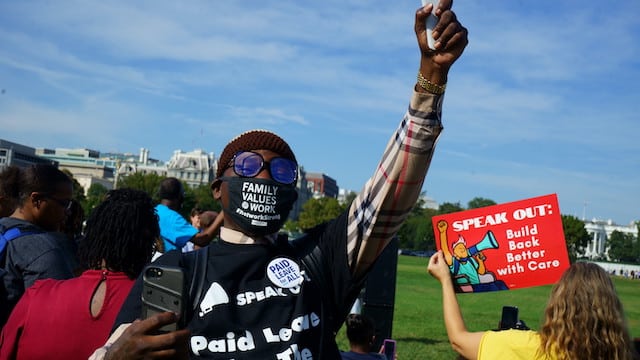Jill Delie of Milwaukee, Wisconsin, is an early childhood special education teacher. She was also recently diagnosed with an incurable chronic nerve condition. Under doctor’s orders, she takes a few days of leave from her job each month to undergo more tests and to learn to manage her disease. “As a single woman and a homeowner, if I lost my job because of my condition, I would lose everything,” she says. Without the Family and Medical Leave Act (FMLA)—which celebrates its 20th anniversary this week—Jill would have had few options. “I would have had no choice but to go into work while experiencing chronic pain,” she says.
As we celebrate this milestone of the FMLA, signed into law by President Bill Clinton on February 5, 1993, Americans aren’t much better off than they were when I was pregnant in 1977 and received a letter from a friend in France saying how sorry she was I had to have my baby in the United States.
That’s right: The United States of America ranks right up there with Swaziland and Lesotho in having no paid leave policy for new mothers.
At least we have FMLA, which guarantees up to 12 weeks’ unpaid leave forcare of a new baby, a seriously ill child, spouse or parent, or a personal illness. Since Congress implemented the law, Americans have used it more than 100 million times.
But here’s the rub: Half the workforce isn’t covered, because they work for a company with fewer than 50 employees or don’t work enough hours on one job or haven’t been there a full year when the need arises. The law’s definition of “family” doesn’t resemble real families in the U.S. today—FMLA doesn’t kick in for same-sex partners or siblings. Thank goodness most kids don’t get leukemia, but they do get colds and flu and FMLA doesn’t apply to those routine illnesses.
What’s worse, the leave is unpaid. Millions who are eligible each year have to go back to work before they or a loved one is ready.
Americans agree that we shouldn’t be kept from caring for a new baby, or punished for helping a parent get through chemo or recover from a stroke. Paid leave is wildly popular among voters across all demographics and party affiliations. Yet right now, many of us are one illness away from bankruptcy or foreclosure. Somehow, corporate lobbyists have convinced our elected officials that families can manage just fine the way things are.
Consider this: The majority of mothers of newborns don’t receive any income at all while they’re out on leave. According to Census numbers, a quarter of moms return to work within eight weeks of giving birth, and more than half a million women each year go back to work in four weeks or less.
And it’s not just mothers who are struggling. Dads like James Musson from Bound Brook, New Jersey, are tired of being treated “like a spare part.” Men, too, want employment standards that don’t get in the way of them being responsible fathers.
Even those of us who aren’t parents have parents or a partner who may occasionally need surgery or get knocked down by a nasty disease. And none of us is immune to an accident or illness ourselves. So we all need to know that wherever we work, we won’t be forced to put off surgery, abandon a loved one, or suffer a financial crisis just because we’re human. Many employers have already figured out that updating their policies to the 21st century is the smart, as well as the right, thing to do. But if we left it solely to corporations, we’d still have child labor and no minimum wage.
You can make a difference: Take action by finding out whether there’s a campaign in your state. Sign up to get involved. You can also take action by contacting your Congressional representatives and Senators. Let them know that you want them to put family first by supporting efforts to expand access to FMLA and make it affordable.

